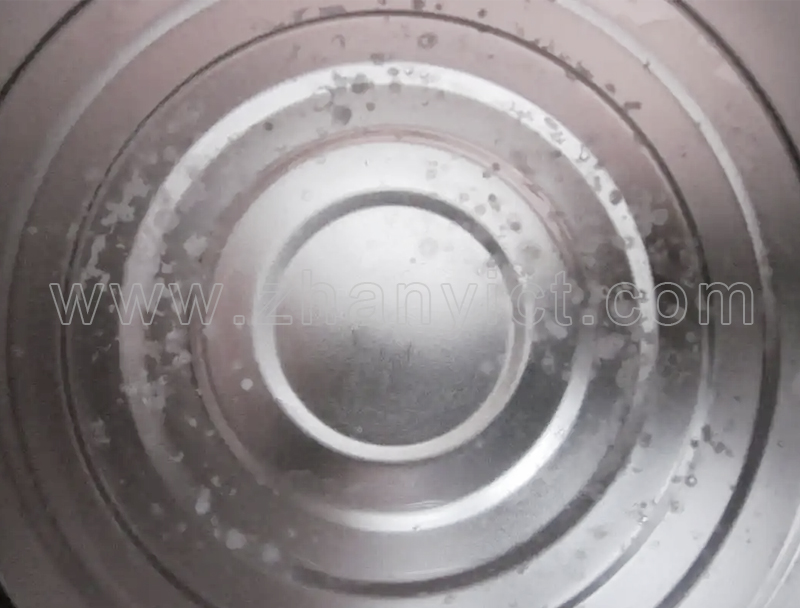Why is it not recommended to use saltwater to clean the inner liner of stainless steel insulated cups?
Hello everyone, "Dong Dong Talk Cup" is here. Perhaps due to the industry's long-standing experience, the author will unconsciously apply many work requirements and experiences to daily habits. Therefore, the practice of using salt water to clean water cups is very rare. http://www.zhanyict.com/en/ProductsDetail-VB-10493.htmlAlthough the author knows that some consumers do this, it is only a very rare practice. However, after receiving widespread attention in one of the author's articles, the author found that many readers and friends have left messages to the author inquiring about the different consequences of using salt water to clean stainless steel insulated cups. Therefore, the author will explain in detail why it is not recommended to use salt water to clean the inner liner of stainless steel insulated cups.
1. Accelerate the corrosion process
Although stainless steel has strong corrosion resistance, this characteristic is based on a very stable passivation film formed on its surface (mainly composed of chromium oxide). http://www.zhanyict.com/en/ProductsDetail-VB-10493.htmlWhen using salt water to clean the stainless steel liner, chloride ions in the salt (mainly sodium chloride) will damage this passivation film, accelerate the corrosion process of stainless steel, and thus reduce its corrosion resistance and service life.
2. Formation of corrosion spots
Using high concentration salt water to soak the stainless steel insulated cup liner for a long time may cause pitting corrosion on the inner wall surface. http://www.zhanyict.com/en/ProductsDetail-VB-10493.htmlThis is manifested as tiny pits or black spots, which not only affect aesthetics, but also may become places for bacteria to accumulate, affecting the safety of drinking water quality.
3. Affects the insulation effect
The insulation effect of stainless steel insulated cups partially depends on the integrity of the inner liner. If the surface of the inner liner corrodes due to saltwater cleaning, it may affect its insulation effect. http://www.zhanyict.com/en/ProductsDetail-VB-10493.htmlAt present, the processing technology for the inner liner of stainless steel insulated cups only involves welding and stretching processes.
The stretching process does not have welding line welds on the inner wall, while the welding process has obvious welding line welds on the inner wall. These welds cannot achieve completely consistent welding fit during the welding process. http://www.zhanyict.com/en/ProductsDetail-VB-10493.htmlDuring the saltwater corrosion process, it is most likely to cause small pores and cracks at the welding line position, which may reduce its vacuum degree and weaken the insulation performance of the insulated cup.
To maintain the insulation effect and extend the service life of stainless steel insulated cups, the following methods are recommended for cleaning:
Use mild detergent and soft cloth or sponge for cleaning, and try to avoid using hard brushes or abrasive cleaning tools to prevent scratching the inner container. http://www.zhanyict.com/en/ProductsDetail-VB-10493.htmlAfter cleaning, it should be thoroughly rinsed and dried to avoid residual water stains.
Regularly use a small amount of white vinegar or baking soda to clean the inner pot. These substances can effectively remove accumulated tea or coffee stains, http://www.zhanyict.com/en/ProductsDetail-VB-10493.htmland are relatively friendly to stainless steel materials.
In short, to ensure the service life and safety of stainless steel insulated cups, it is a wise choice to avoid using saltwater to clean the inner liner.

Dongguan Zhanyi Commodity Technology Co., Ltd. specializes in the production of metal cups, plastic cups, coffee cups, suction mug, lunch boxes, food jar, travel mugs, portable water bottles, sports bottles, home life desktop trash cans, thermos bottles, etc.These products are all our annual exports, and are recognized and loved by the US, Europe, Australia, Japan, South Korea, Taiwan, Hong Kong and other consumers. Support for small quantity order, fast customization.